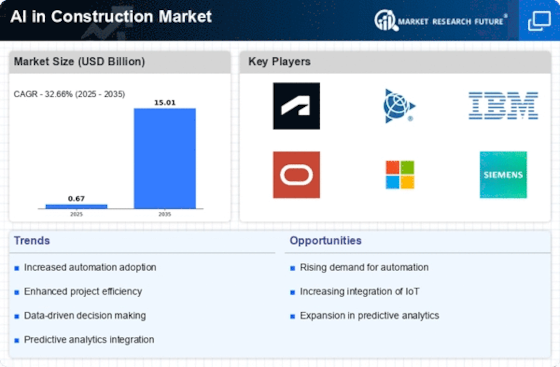Top Industry Leaders in the AI in Construction Market

Competitive Landscape of AI in Construction Market
The construction industry, traditionally known for its slow embrace of technology, is witnessing a seismic shift with the advent of Artificial Intelligence (AI). From streamlined workflows to predictive maintenance, AI promises to revolutionize every stage of the construction lifecycle, driving efficiency, cost savings, and sustainability. This burgeoning market is attracting a diverse range of players, each vying for a slice of the pie. Let's delve into the competitive landscape of AI in construction, analyzing key players, strategies, and investment trends.
Key Players:
- IBM Corporation (U.S.)
- Oracle Corporation (U.S)
- SAP SE (Germany)
- Alice Technologies (U.S.)
- Microsoft Corporation (U.S.)
- Aurora Computer Services(U.K)
- Autodesk (U.S.)
- eSUB (U.S.)
- io(U.S.)
- Building System Planning (U.S.).
Strategies for Success:
- Specialization: Companies are carving out unique niches within the vast AI landscape. Some focus on specific applications like predictive maintenance or autonomous construction vehicles, while others offer comprehensive platforms catering to various needs.
- Partnerships and Collaborations: Building strong partnerships with established construction companies and industry associations is crucial for gaining traction and overcoming resistance to change. Open-source initiatives and collaborative research projects are also fostering innovation.
- Data-driven Approach: AI thrives on data. Companies are actively investing in data acquisition and analytics to develop robust algorithms and gain insights into construction processes. Partnerships with data providers and sensor manufacturers are becoming increasingly important.
- Focus on User Experience: The construction industry is not known for its tech-savvy workforce. Companies are developing user-friendly interfaces and intuitive AI tools to bridge the gap and ensure widespread adoption.
Factors for Market Share Analysis:
- Technology Offering: The breadth and depth of AI solutions offered, their accuracy and reliability, and their integration with existing workflows are key factors.
- Customer Focus: Understanding the specific needs and challenges of different construction segments (residential, commercial, infrastructure) and tailoring solutions accordingly is crucial.
- Pricing and Implementation: Competitive pricing models and efficient implementation strategies that minimize disruption to existing operations are essential for market penetration.
- Brand Reputation and Trust: Building trust in the reliability and security of AI solutions is paramount, especially in safety-critical applications.
New and Emerging Companies:
- Construction Robotics: Built Robotics, Scalable Robotics, and Ekso Bionics are developing robots for automating repetitive tasks like bricklaying, welding, and material handling.
- Site Monitoring and Analytics: Vizzlearn, OpenSpace, and PlanGrid are using AI to analyze data from cameras, drones, and sensors for real-time project monitoring, progress tracking, and safety compliance.
- Generative Design and Optimization: Branch Technology and Arup are using AI algorithms to generate optimized designs for buildings and infrastructure, reducing material waste and construction time.
Current Company Investment Trends:
- Venture Capital Funding: VC firms are pouring billions into AI construction start-ups, recognizing the immense potential of this nascent market.
- Internal R&D: Established construction companies are investing heavily in internal R&D initiatives to develop their own AI capabilities and remain competitive.
- Acquisitions and Partnerships: Strategic acquisitions and partnerships are becoming commonplace, as companies seek to expand their offerings and gain market share.
Latest Company Updates:
Building information modelling (BIM) technology will see the release of a new product from OpenSpace in 2023, which will be used in the industry to solve problems quickly. Following the introduction of its most recent partnership with Revizto, OpenSpace, a leader in 360-degree reality capture and AI-powered analytics, has announced the launch of OpenSpace BIM+. By enabling BIM coordination on site, OpenSpace BIM+ is a set of simple-to-use 3D tools that assist field teams and virtual design and construction (VDC) teams in finishing their work more quickly.
Samsara Inc. revealed new software capabilities and technologies for GPS-enabled asset management of distributed equipment and on-road vehicles in Austin, Texas, at its Beyond conference in 2023. Among the important features announced were those that are essential for the construction industry. Thousands of connected operations use Samsara's Connected OperationsTM Cloud as their backbone.
Beta feature










